Oak Trees Native to Central Florida
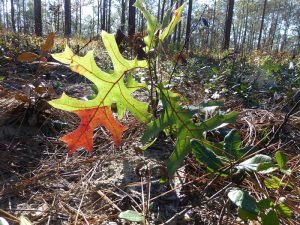
Some species of oaks have a broad range of mature leaf shape and, in many, the leaves of new shoots are entirely different from the mature leaves. To add to the confusion, oaks hybridize between different species growing in close proximity to one another, in turn, producing leaf shapes having characteristics of both parents. These factors make identification to the novice challenging. Identification is most reliable when using leaves from the crown branches.
Oaks are monoecious, having male and female flowers on the same plant. Pistillate (female) flowers are inconspicuous, and staminate (male) flowers in some species appear as hanging catkins at the base of emerging growth of the season.
Oaks are divided into two groups: the white and the black (or sometimes called the red). The white oak’s acorns mature in the fall of the year that they are formed and are preferred by wildlife because they are sweeter than the black acorn. The black oak’s acorns mature the second year following their formation and tend to be much more bitter than the white’s.
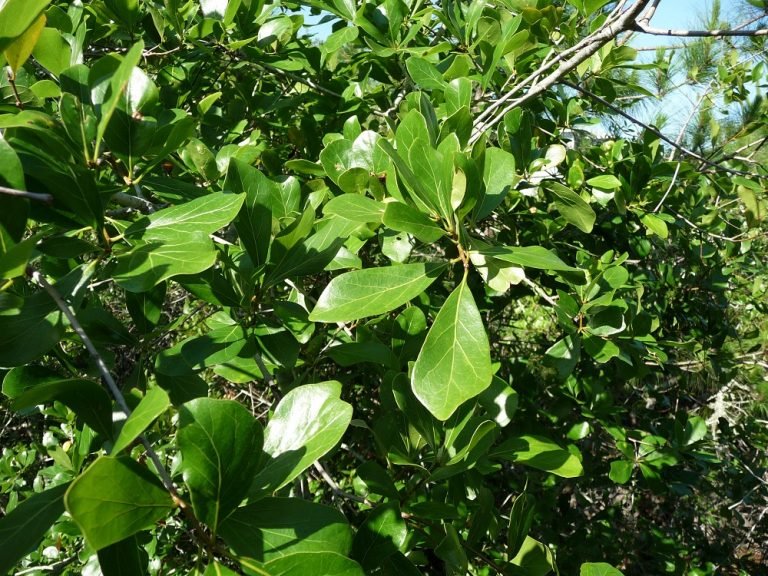
Chapman's Oak
(Quercus chapmanii)
Habit: A small evergreen tree to about 24 feet in height.
Leaves: Alternate, simple, thick, leathery & coarsely veined, ¾ – 4 ¾ in. long & ¼ to1 ½ in. wide. The margins are entire, and extremely revolute – turn the leaf upside down & it looks like an elongated bowl. The upper leaf surface is dark green, and the lower is dull gray. The petioles are densely pubescent.
Flowers: Male flowers appear at the tips of the branches in 3 ¼ – 4 ¾ in. catkins.
Acorn: 5/8 – 1 in. long and in the white group
Habitat: coastal & inland sand pine scrub, and oak scrub

Sand Live Oak
(Quercus geminata)
Habit: An evergreen tree to 30 feet in height. The bark is thick & roughly ridged.
Leaves: Alternate, simple, thick, leathery & coarsely veined, ¾ – 4 ¾ in. long & ¼ to1 ½ in. wide. The margins are entire, and extremely revolute – turn the leaf upside down & it looks like an elongated bowl. The upper leaf surface is dark green, and the lower is dull gray. The petioles are densely pubescent.
Flowers: Inconspicuous
Acorn: ½ – ¾ in. long and in the white group
Habitat: coastal dunes, sand pine scrub, and coastal hammocks

Bluejack Oak
(Quercus incana)
Habit: A small deciduous tree reaching 36 feet in height. The bark is dark gray to black, and deeply furrowed.
Leaves: Alternate, simple, and elliptic to lanceolate. The margins are entire, 2 – 4 in. long & ½ – 1 in. wide. The upper leaf surface is bluish to ashy green, and the lower is silvery and tomentose. The apices are tipped with a short bristle.
Flowers: inconspicuous
Acorn: ½ – 5/8 in. long and in the black group
Habitat: sandhill and dry pinelands

Scrub Oak
(Quercus inopina)
Habit: A small evergreen tree to about 8 feet in height.
Leaves: Alternate, simple, elliptic, ¾ – 4 ¾ in. long and ½ – 3 in. wide. Margins are entire and strongly revolute. Lower leaf surface with a powdery yellow fuzz.
Flowers: inconspicuous
Acorn: ½ in. long and in the black group.
Habitat: sand pine scrub
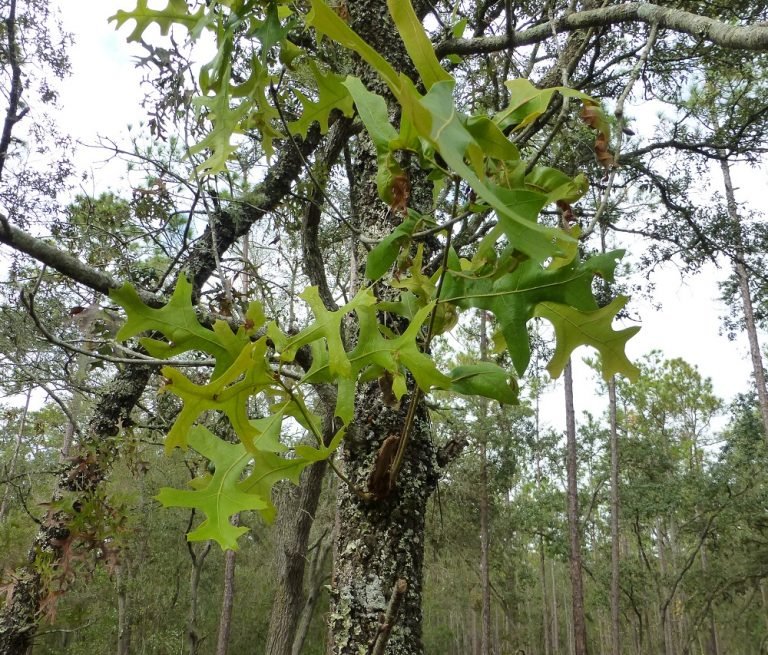
Turkey Oak
(Quercus laevis)
Habit: A deciduous tree reaching 45 feet in height. The bark is dark gray, blocky & furrowed.
Leaves: Alternate, simple, 3 – 12 in. long & 1 – 8 in. wide, with three to seven deep lobes. The lower surface is hairy in the vein axils.
Flowers: Male flowers appear at the tips of the branches in 3 ¼ – 4 ¾ in. catkins.
Acorn: ¾ – 1 in. long and in the black group
Habitat: sandhill and dry pinelands
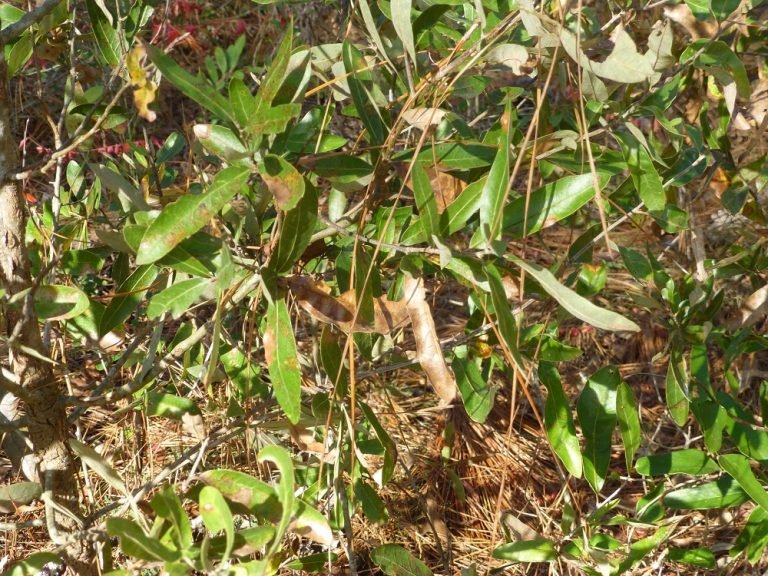
Laurel Oak
(Quercus laurifolia)
Habit: A large deciduous tree to 90 feet in height. Dark grayish bark.
Leaves: Alternate, simple, entire, 2 – 4 in. long & ½ – 1 in. wide, obovate to oblanceolate. Some leaves may appear diamond shaped.
Flowers: inconspicuous
Acorn: ½ – ¾ in. long and in the black group
Habitat: moist to wet woods and mesic oak-pine forest

Sand Post Oak
(Quercus margarettae)
Habit: A deciduous tree reaching 30 feet in height at maturity.
Leaves: Alternate, simple, ¾ – 6 in. long & up to 5 in. wide. Typically with 3 to 5 rounded or squarish lobes.
Flowers: inconspicuous
Acorn: ¾ in. long and in the white group
Habitat: sand ridges and pine-oak scrub
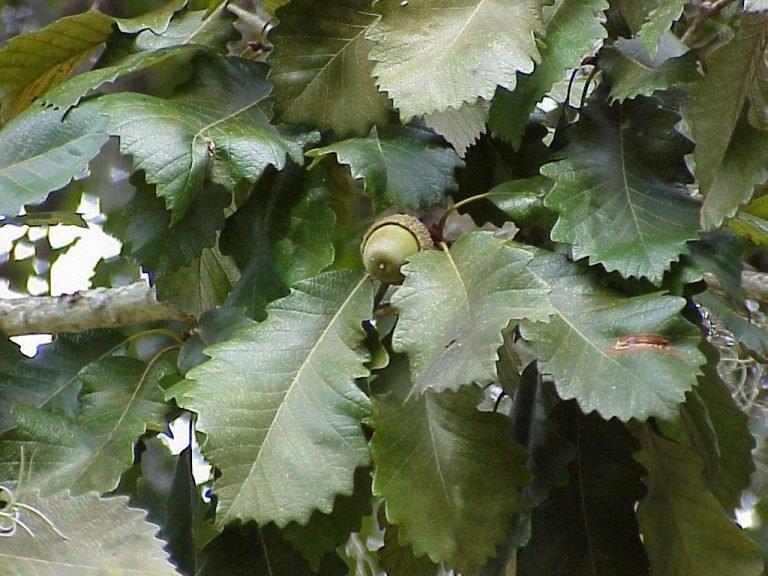
Swamp Chestnut Oak
(Quercus michauxii)
Habit: A large deciduous tree reaching 100 feet in height. The bark is scaly.
Leaves: Alternate, simple, obovate, 4 – 9 in. long & 2 ¾ – 6 in. wide. Margins with shallow lobes that appear undulate rather than lobed.
Flowers: inconspicuous
Acorn: 1 – 2 in. long and in the white group
Habitat: mixed hardwood forests, mesic hammocks, & bluffs
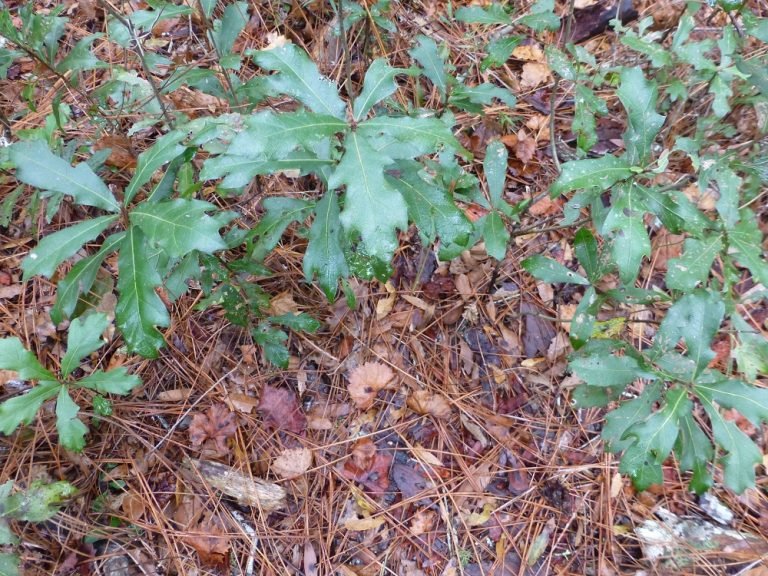
Dwarf Live Oak
(Quercus minima)
Habit: An evergreen shrub reaching 3 feet in height.
Leaves: Alternate, simple, oblong to obovate, ¾ – 4 in. long, often toothed, less often entire. Lower leaf surface is finely pubescent.
Flowers: inconspicuous
Acorn: ½ – ¾ in. long and in the black group
Habitat: pine flatwoods
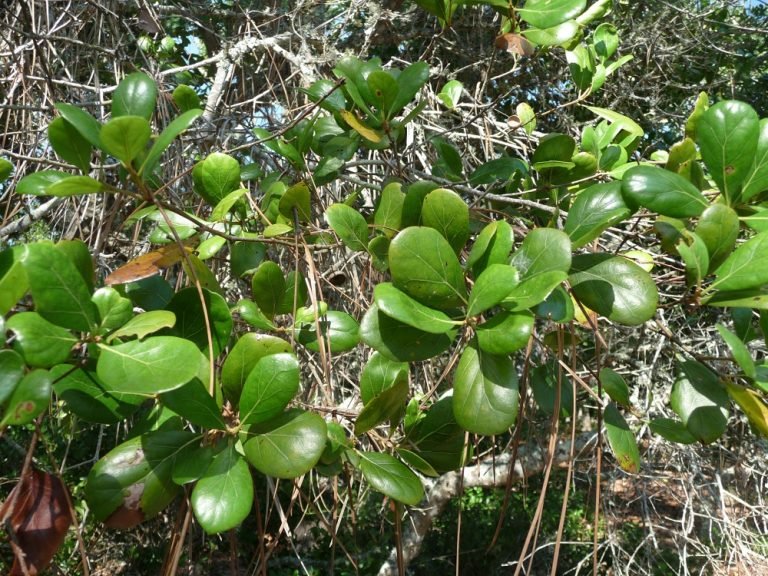
Myrtle Oak
(Quercus myrtifolia)
Habit: An evergreen tree to 25 feet in height.
Leaves: Alternate, simple, may be elliptic, oblong, or oval, ¾ – 3 in. long & ½ – 2 in. wide. Margins entire or lobed, and revolute. Upper surfaces are dark green, and lower surfaces yellowish green.
Flowers: inconspicuous
Acorn: 3/8 in. long and in the black group
Habitat: inland dunes, coastal dunes, & coastal regions
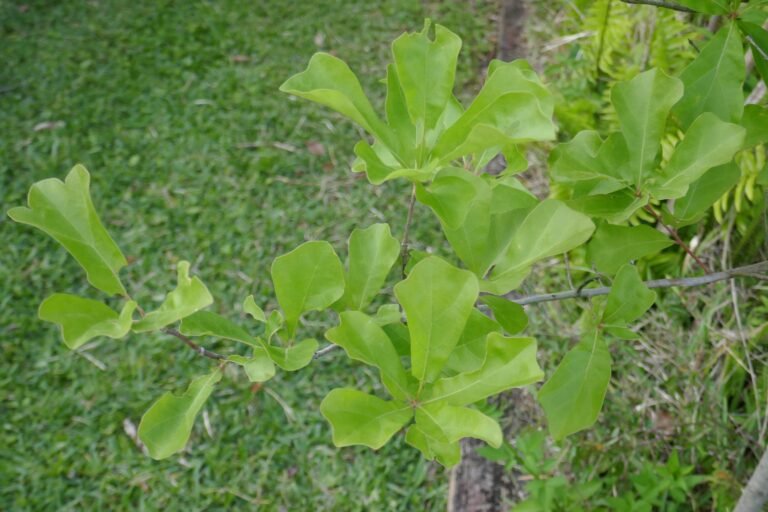
Water Oak
(Quercus nigra)
Habit: A deciduous tree to 75 feet in height. The bark is smooth to shallowly furrowed.
Leaves: Alternate, simple, entire and variable in shape. Leaves may be three lobed, but are more commonly spatulate, 2 – 4 in. long & 1 – 2 in. wide.
Flowers: male flowers are hanging catkins that are 2 – 3 in. long
Acorn: 3/8 –5/8 in. long and in the black group
Habitat: lowland and flood plain woods
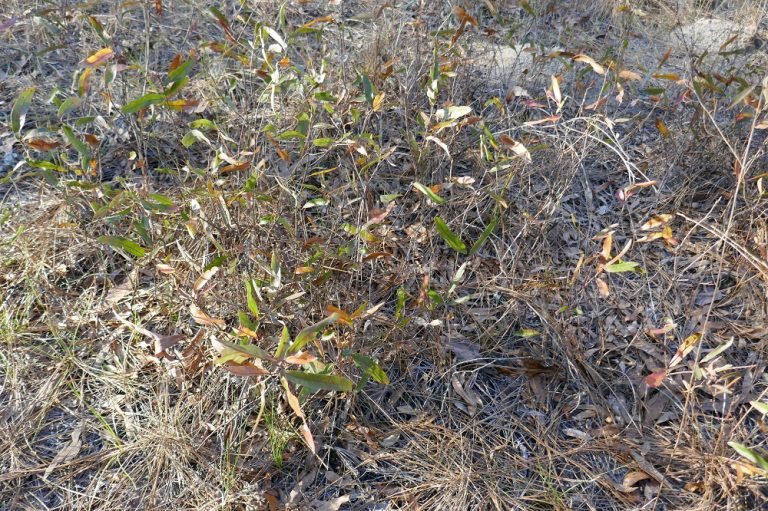
Running Oak
(Quercus pumila)
Habit: A semi-deciduous shrub, commonly forming thickets of subterranean runners, generally 3 feet tall. If the site has not been burned recently they may be 6 feet in height.
Leaves: Alternate, simple, oblanceolate or spatulate, narrowly elliptic, or lanceolate, with entire margins.
Flowers: inconspicuous
Acorn: ½ – ¾ in. long and in the black group
Habitat: well-drained pinelands

Live Oak
(Quercus virginiana)
Habit: Large, spreading, evergreen tree to 60 feet in height. Rough bark with the short, central trunk dividing above the ground into several large branches.
Leaves: Alternate, simple, entire, leathery, and stiff to2 – 5 in. long & ½ – 2 in. wide. Upper leaf surfaces are green & shiny above, and pale gray & sparsely tomentose below. Leaves of saplings and shoots may be toothed or shallowly lobed.
Flowers: Male flowers are hanging catkins 2 – 3 in. long.
Acorn: ½ – 1 in. long and in the white group
Habitat: well-drained woods, pine flatwoods, and salt marshes
Glossary:
alternate – an unpaired arrangement – as opposed to opposite. Alternate leaves are located singly on the stem.
apical – located at the apex or tip
axil – the upper angle between two structures (the leaf axil is between the leaf and the stem)
compound leaf – a leaf in which the blade is subdivided into two or more leaflets. The opposite is a simple leaf.
elliptic – a shape where the middle is wider than the two tapered ends
entire – leaf margins without teeth, lobes, or divisions
lanceolate – lance-shaped, the base is broadest and gradually narrowed at the apex
margin – the edge of the leaf
oblanceolate – the apex is broadest and gradually narrowed to the base (the opposite is lanceolate)
obovate – the apex (or tip) is wider than the base
petiole – the leaf stalk
revolute – with the margins rolled backward toward the underside
simple leaf – a leaf with only one blade, not compound
spatulate – shaped like a spatula, rounded at the apex and tapering to the base
tomentose – a covering of short, matted or tangled soft, wooly hairs
Arny, Nancy. Common Oaks of Florida. University of Florida, Institute of Food and Ag Sciences, Fact Sheet FOR 51
Godfrey, R.K., and J.W. Wooten. Trees, Shrubs, and Woody Vines of Northern Florida and Adjacent Georgia and Alabama. University of Georgia Press: Athens, GA 1981.
Wunderlin, Richard P. Guide to the Vascular Plants of Central Florida. University Press of Florida: Tampa, FL. 1991
Next Article: Palms Native to Central Florida
